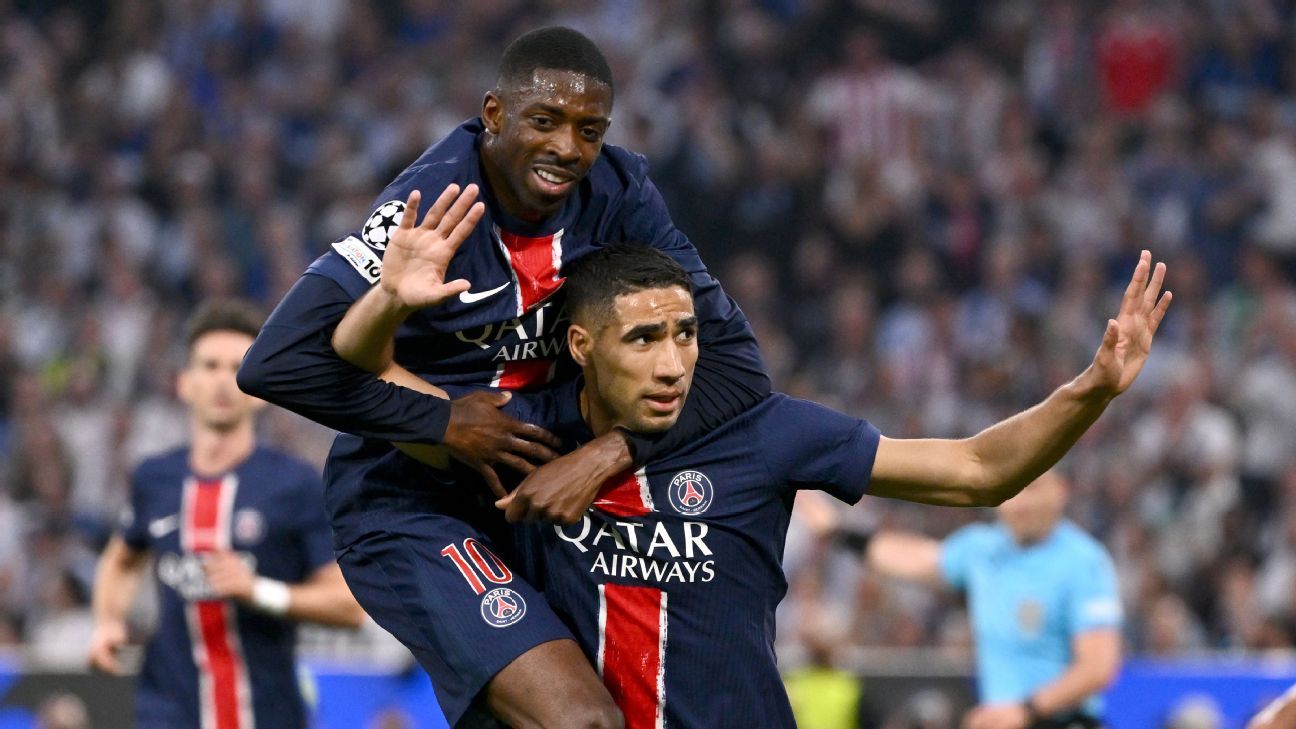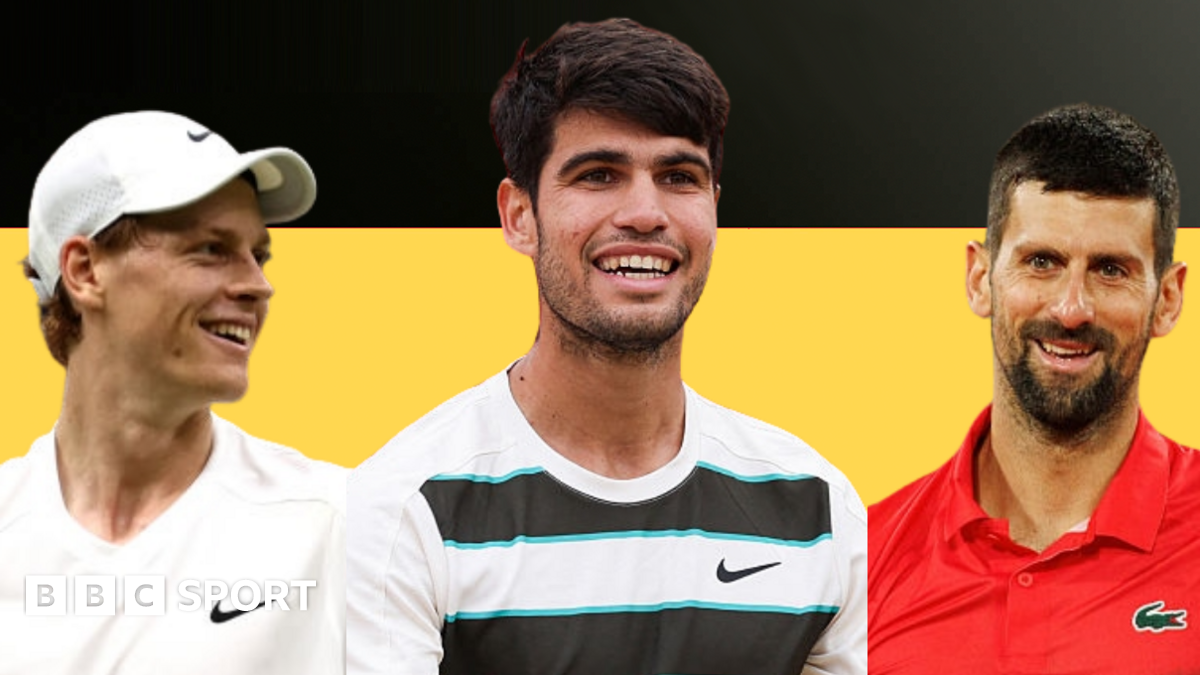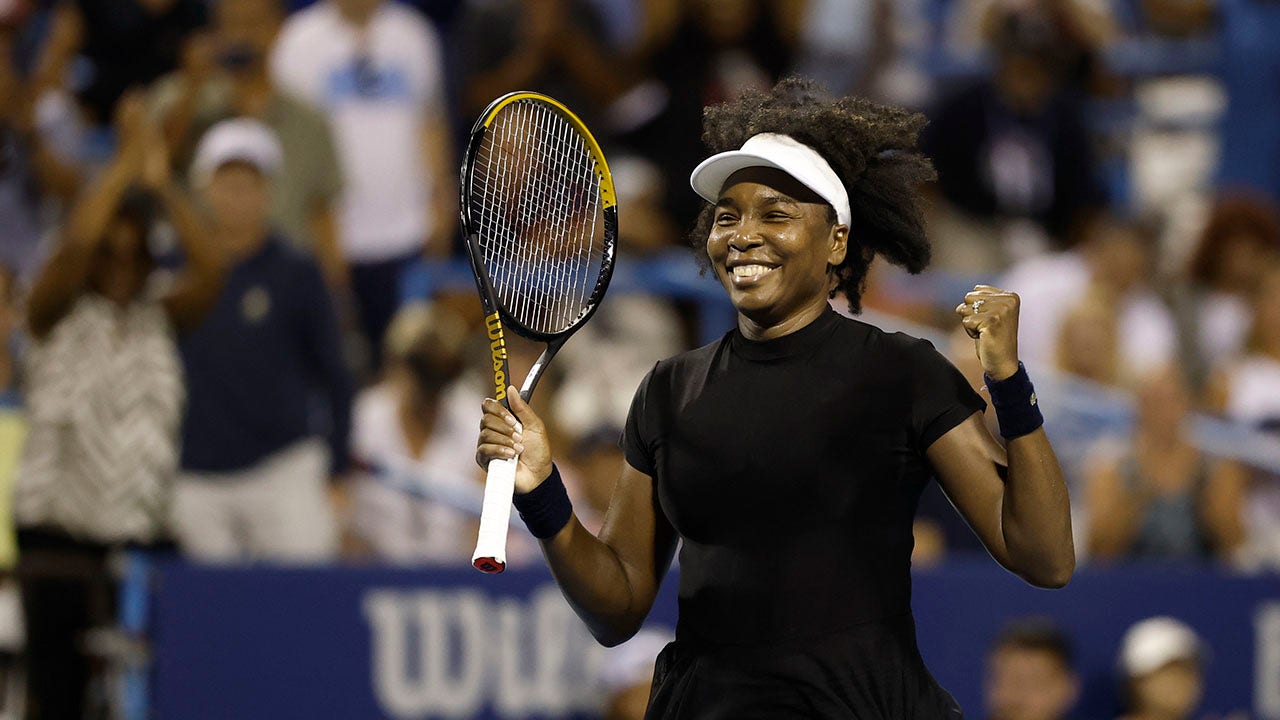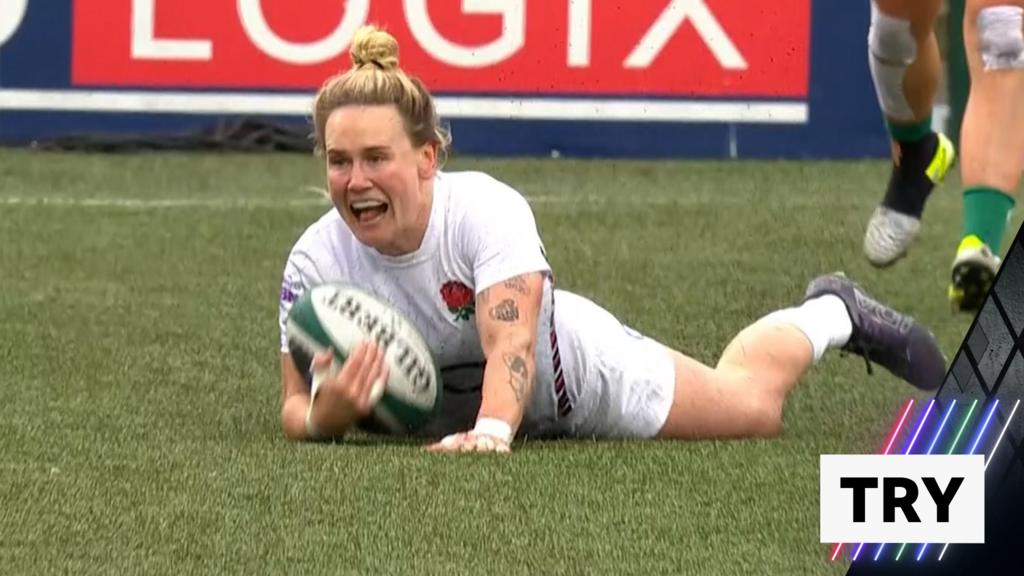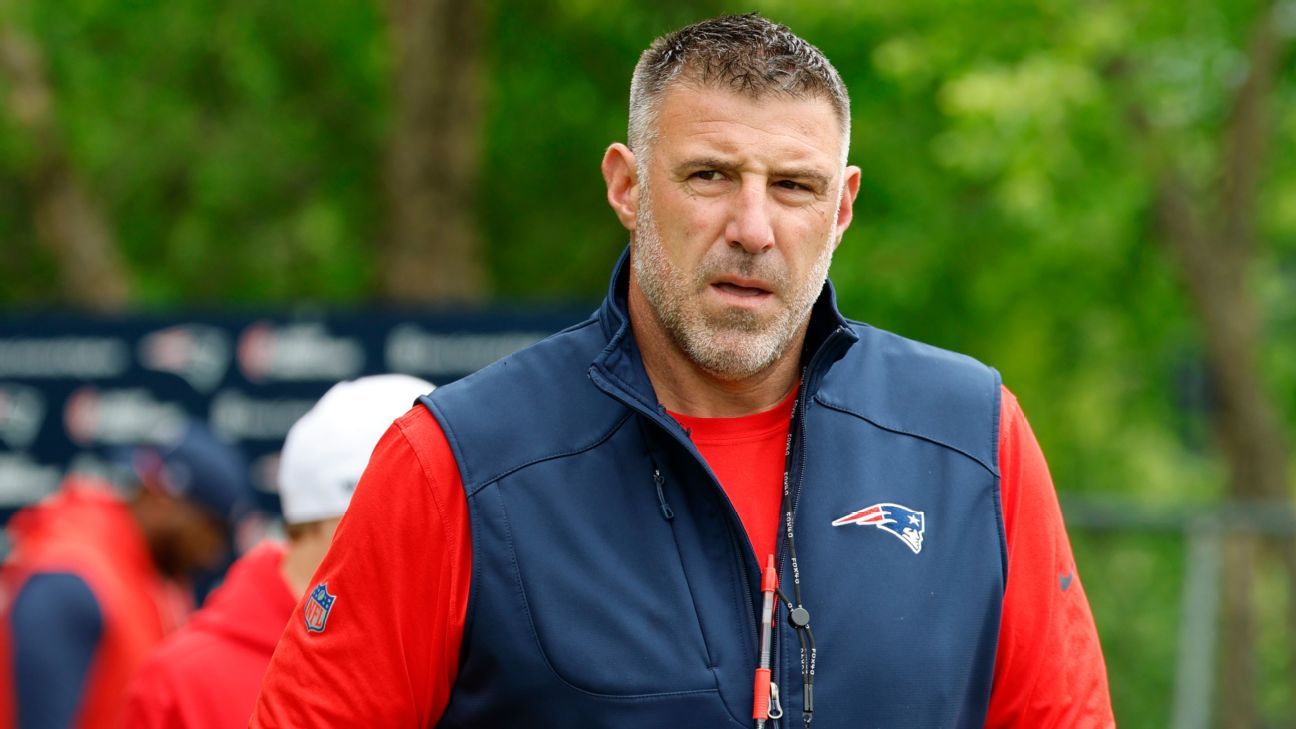Barring something unexpected, Ousmane Dembélé is going to win the Ballon d’Or.
The Paris Saint-Germain forward scored 21 goals and added six assists in Ligue 1, and PSG won the league by 19 points. He scored eight goals and added six assists in the Champions League, and PSG won the Champions League final by five goals.
On top of all that, PSG’s transformation into the best team in the world almost directly coincided with Dembélé moving to center forward and playing off the charts in 2025. So, not only does Dembélé have the statistics and the trophies that voters typically look for, but he also has the narrative. PSG are better than everyone else — and we all can see that Dembélé is the biggest reason why.
Could the voters be swayed by Chelsea’s 3-0 win over PSG in the Club World Cup final and, I don’t know, give the award to Cole Palmer instead? Jorginho finished third in 2021 and Dani Carvajal finished fourth last season, and Palmer is significantly better than both of them, so I’m not putting anything past them. But in terms of trying to predict this thing: Dembélé is still the major favorite.
The more interesting question, then, is who should win the Ballon d’Or?
Yes, back in March I wrote a column titled “How Ousmane Dembélé became the world’s best soccer player.” But I was referring to that specific moment in time — right after PSG beat Liverpool at Anfield and eliminated them from the Champions League in a penalty shootout — and that’s not really even what the award is about. Four years ago, the award-bodies-that-be switched the judgment period from a calendar-year timeframe to a period that starts in August and ends the following July.
In other words: which player had the best 2024-25 season? Let’s figure it out.
What if we look at the whole season?
Given that most of us still accept PSG as the clear best team in the world — even after what happened in the Club World Cup final on Sunday — it’s funny to think back to a couple points in the season.
As of Dec. 1 last year, PSG had won once, drawn once, and lost three times across the first five Champions League matches. They’d scored three goals, conceded five, and were legitimately flirting with not even getting out of the league phase. From that point on, they played 12 more games in Europe: They won 10 games, lost two, scored 35 goals, and conceded nine.
Thanks to that near-implosion at the start, though, PSG drew first-seeded Liverpool in the round of 16. The second leg at Anfield was one of the best 1-0 matches you’ll ever see, and all that kept it from going down as an all-time classic was a couple of balls not bouncing past the goal line.
Had Liverpool centerback Jarell Quansah’s 79th-minute header bounced off of the post and in — instead of out — then the story of this season is so different, isn’t it? Or even if just two shots go differently in the shootout. Then there’s no Dembélé redemption arc, Désiré Doué never has his breakout in the final, and no one is talking about anyone on PSG as a worthy Ballon d’Or winner.
How do I know this? Because no one was talking about it until that game.
The best representation of collective soccer wisdom we have is the team of the month from European Sports Media. Each month, since at least 1995, a group of journalists working for a collection of magazines across Europe have voted on their best XI. The votes get added together, and the players with the most votes make that month’s team.
The Ballon d’Or vote totals aren’t useless pieces of information, but they tend to be way too skewed toward whatever teams have won trophies that season, and there’s no positional designation. Since it’s updated every month, the ESM list provides a much more comprehensive and consistent picture of who the people who cover soccer think are playing the best soccer throughout the season.
For example: Since 1995, Lionel Messi made the team 88 times, Cristiano Ronaldo was selected 51 times, and no one else has more than 31 selections.
Or, as of February of this season: only one PSG player had been selected to a team of the month — and it wasn’t Dembélé. No, it was Achraf Hakimi. For comparison’s sake: Liverpool already had 18 (!) team of the month selections. Heck, they’d even had two separate goalkeepers make the team, in Alisson Becker and Caoimhín Kelleher. After Liverpool, the joint-next-most selections came from Barcelona and Real Madrid, with seven each.
So, when you add up all of the votes at the end of the season, PSG’s players don’t rate as highly as you’d expect. Here’s everyone who received at least 20 individual votes over the course of the season, per the July issue of World Soccer magazine:
1) Mohamed Salah, Liverpool: 43
2) Virgil van Dijk, Liverpool: 42
T-3) Robert Lewandowski:, Barcelona 32
T-3) Kylian Mappe, Real Madrid: 32
T-5) Lamine Yamal, Barcelona: 26
T-5) Achraf Hakimi, PSG: 26
7) Harry Kane, Bayern Munich: 24
8) Ousmane Dembélé, PSG: 23
9) Trent Alexander-Arnold, Liverpool: 22
10) Scott McTominay, Napoli: 21
11) Cole Palmer, Chelsea: 20
The flipside of PSG, then, is Liverpool. They had pretty much the worst-possible season in terms of a great team trying to capture the Ballon d’Or narrative.
Liverpool dominated the Premier League and the Champions League up through mid-March, but they were quite unlucky with finishing first in the league phase, but still drawing PSG and therefore ending their Champions League run early. They lost the Carabao Cup final a few days after the PSG match, and while a rotated squad knocked out of the FA Cup a few weeks prior, the dominant team up to that point in the 2024-25 season suddenly had very little to play for.
Who else should have a Ballon d’Or case?
If we just look at goals and assists in domestic play, then there’s no doubt who should win the award. One guy has 13 more goal contributions than every other player:
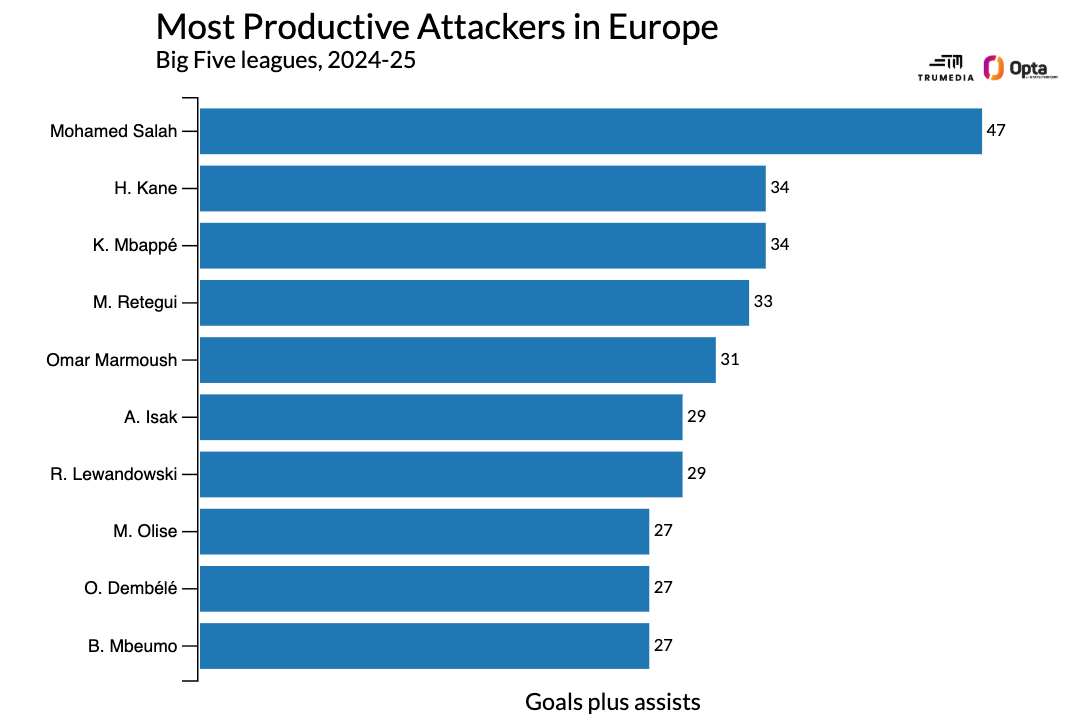
Yep, Mohamed Salah. However, there are two problems with looking at things this way.
The first is that we’re counting penalties as if they’re just as valuable as any other goal. And, well, they are — they add one more point to your score — but unlike every other shot, the player doesn’t have to do anything to generate the shot (unless he’s the one who draws the foul). His coach just tells him to take it.
And then, we’re also counting assists as equal. So, a fantastic through-ball that creates a breakaway for a teammate is the same as passing the ball to Maradona before he dribbles through England’s entire team.
We can rectify this. For a season-end award, penalties shouldn’t be meaningless, but they also shouldn’t just be worth a full goal. Instead, we’re going to award each player with the difference between the expected conversion rate (79%) and a goal, so every penalty goal is worth 0.21 goals. And then for assists, we’re going to use Stats Perform’s expected assists, or xA, where every pass on the field gets valued based on how likely it is to turn into a goal if the player decides to shoot the ball.
Once we do those adjustments and then add it all together, here’s how those numbers look:
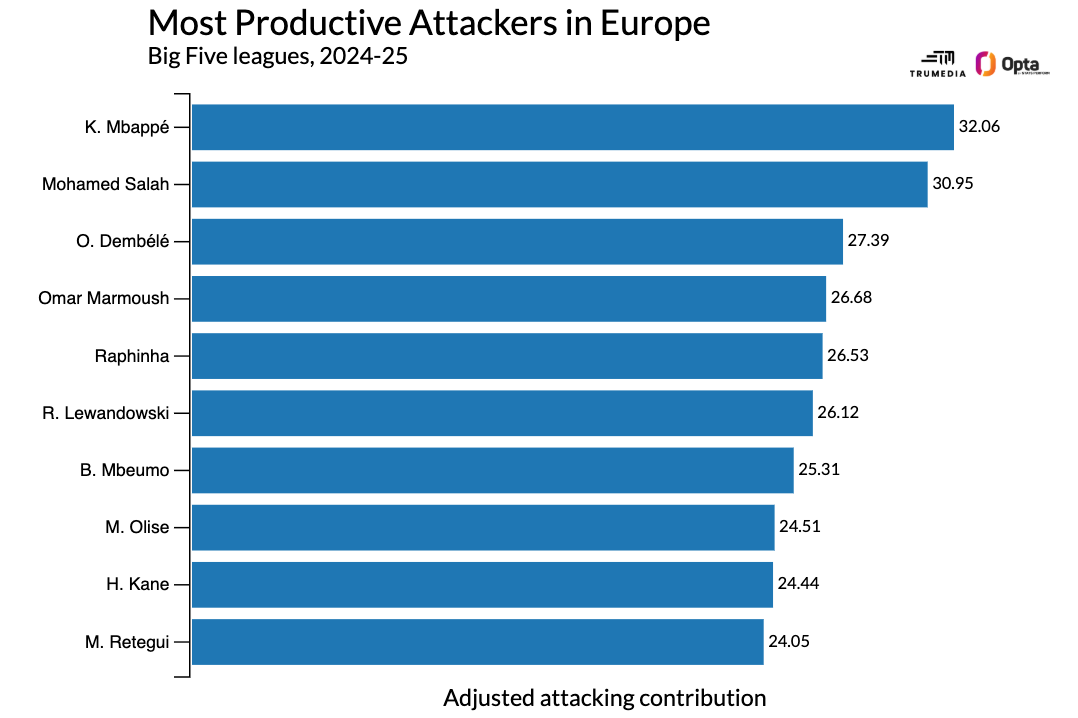
Kylian Mbappé is our new front-runner. However, we’re still leaving out the tournament where these players get to play against each other.
If we add in Champions League play, then the top 10 ends up looking like this:
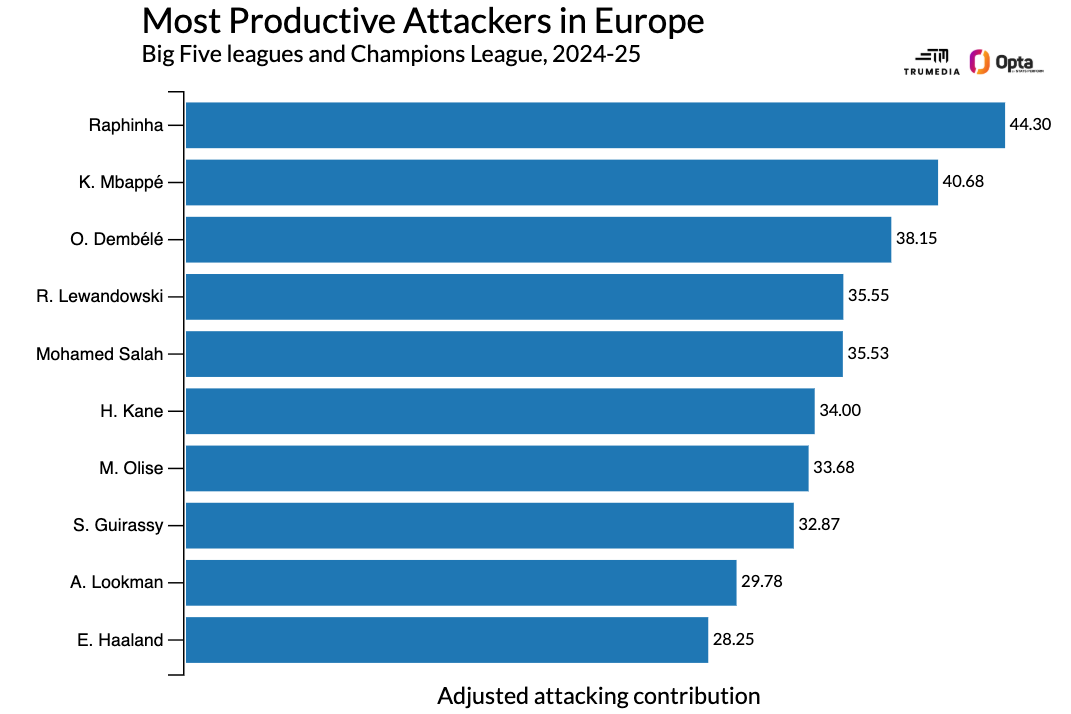
Raphinha is now in the top spot among a group that we can cut to three players.
We can lose Mbappé because his top-line numbers are overestimating his impact with Real Madrid. They became a worse overall attacking team after he arrived — not to mention that PSG got significantly better and won the Champions League right after he left. Robert Lewandowski drops off because he’s not even the most productive player on his own team, and we’re cutting out all the Bayern Munich guys because they got to beat up on a bad Bundesliga field this season.
So, among the attackers, that leaves us with Raphinha, Dembélé, and Salah. And yes, that’s Raphinha and not Lamine Yamal. Raphinha had one more assist than Yamal this season — and then 17 more goals. You can make the argument that Yamal is providing more value than Raphinha in other areas of the field, but you can’t make the argument that Yamal is providing 19 more goals worth of value in other areas of the field.
What about the non-attackers? Virgil van Dijk got the second-most votes of any player in the ESM polls throughout the season. In fact, he’s now made more team-of-the-month appearances than any centerback since 1995. If you want to say he’s the best centerback of the modern era, I’m not going to stop you.
Van Dijk already had the highest peak, and now he’s starting to stretch out his longevity. But like with Lewandowski, who now has more team-of-the-season appearances than any center forward since 1995 and probably is the best center forward of the modern era, he wasn’t even the best player on his own team this season.
However, there is another defender who deserves to be in the conversation. If we look at that same adjusted attacking contribution number, but filter down to players that Stats Perform considers as defenders, then here’s what the top 10 looks like:
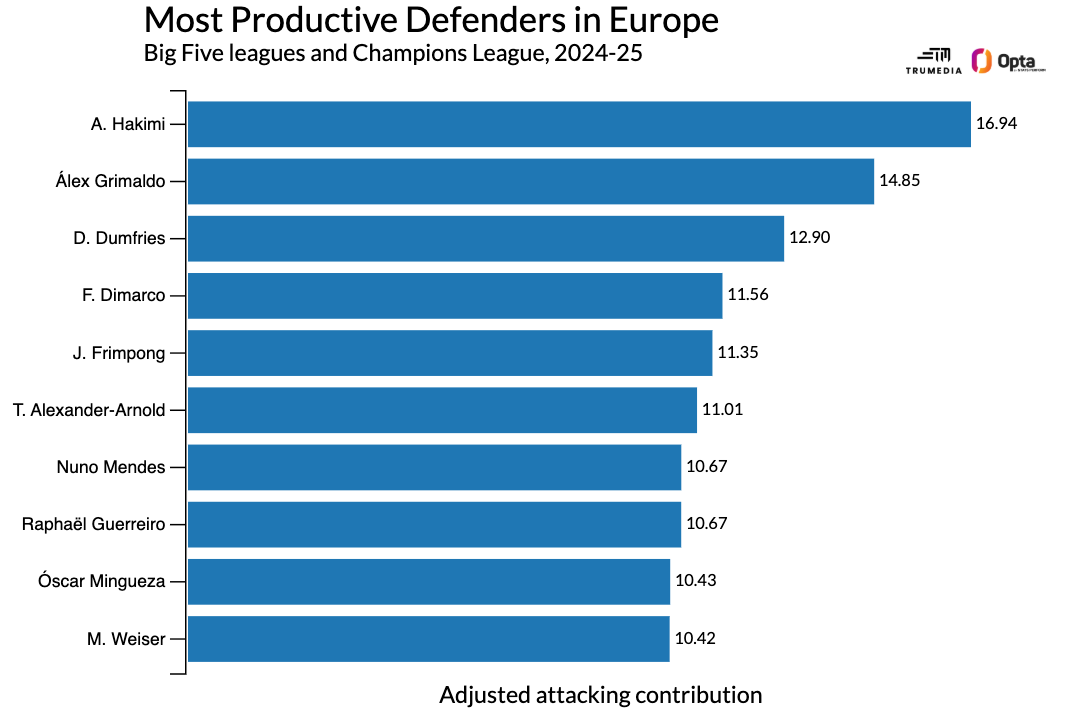
And even that chart is underselling how much better Hakimi is than everyone else.
The four players directly behind him are wingbacks for Bayer Leverkusen and Inter Milan, so they’re classified as defenders but have nowhere near the defensive responsibility that a more traditional wingback like Hakimi does. So, really, the closest comparative player is Trent Alexander-Arnold, whose output was 50% worse than Hakimi’s. Plus, Hakimi is — at worst — an average defender, so he’s not taking anything off the table without the ball.
There’s no one else in the world who can do what he does.
Dembélé, Salah, Raphinha, or Hakimi?
Ultimately, while PSG’s late-season triumph makes the choice for the award seem obvious, there are four players who would all be worthy winners. Who you choose depends on how you view the award, and since the criteria remains incredibly vague, there is still plenty of room for interpretation.
The case for Hakimi is that he’s better than the next-best player at his position by a bigger margin than the best player at any other position. If we came up with some kind of value-above-average metric at each position, he might grade out higher than anyone else. Throw in the treble PSG just won, and that’s a strong argument.
1:35
Laurens: Dembélé has secured Ballon d’Or at Club World Cup
Julien Laurens reacts to Ousmane Dembélé’s performances at the Club World Cup.
The case for Raphinha is that he was the most productive player in the world after we made our minor adjustments that controlled for penalties and the quality of chances created. On top of that, he’s also a better defender than the other two attackers listed here — he played a vital role in the effectiveness of Barcelona’s high press. The right-footed left winger role is probably the most competitive position in the sport, and no one was better than he was this season.
The case for Salah can be a simple one: He put up 54 combined goals+assists, while no one else in the world hit 50. Sure, those numbers dip down a bit once you control for penalties and chance-creation quality, but the Premier League was — by far — the most competitive top-to-bottom league in the world this past season. (See: the teams that finished 15th and 17th in the table both making the Europa League final, and fourth winning the Club World Cup.)
Salah also passed the ball into and touched the ball inside of the box way more often than any of these guys. If you replaced all four of these players with a league-average player, then Liverpool would easily suffer the most. He carried a way bigger burden than any of Hakimi, Raphinha, and Dembélé did.
The case for Dembélé is the simplest one: the best attacker on the best team in the world. He outplayed Salah when the theoretical two best teams in the world met back in March. And, well, he was simply excellent at everything you expect from a modern attacker: scoring, creating, facilitating, off-ball running, and pressing.
The main argument against Dembélé is a familiar one: He didn’t play enough! But for the first time in his career, you could actually flip that in his favor.
Both Salah and Raphinha played over 4,000 minutes across the Champions League and their domestic leagues. Hakimi hit slightly north of 3,600, while Dembélé was just a hair below 2,900 minutes. Salah ranked sixth among all players — including goalkeepers! — in minutes played across the two major competitions this season, and Raphinha wasn’t far behind in 14th. Dembélé, meanwhile, was all the way down in 259th. Yet, despite that, he still ranked fourth in goals+assists and third in the adjusted number. On a per-minute basis, he’s been the most productive player in the world, by a sizable margin.
The point of an exercise like this is to try to step outside of the prevailing narrative and the team-colored fog to identify who actually was the best individual player in the world this past season. But when it’s as close as it is between these players, then marginal factors like team success and head-to-head matchups can serve as a tiebreaker. Dembélé showed up for the games that mattered, proved his Ligue 1 numbers weren’t a fluke, and still nearly matched Raphinha and Salah’s total production in significantly fewer minutes.
And so, if I were given me my own top-10 ballot, here’s how I would fill it out:
1) Ousmane Dembélé, PSG
2) Mohamed Salah, Liverpool
3) Raphinha, Barcelona
4) Achraf Hakimi, PSG
5) Virgil van Djik, Liverpool
6) Lamine Yamal, Barcelona
7) Robert Lewandowski, Barcelona
8) Harry Kane, Bayern Munich
9) Pedri, Barcelona
10) Julián Álvarez, Atletico Madrid
Enjoy the offseason. Preseason started last week.

